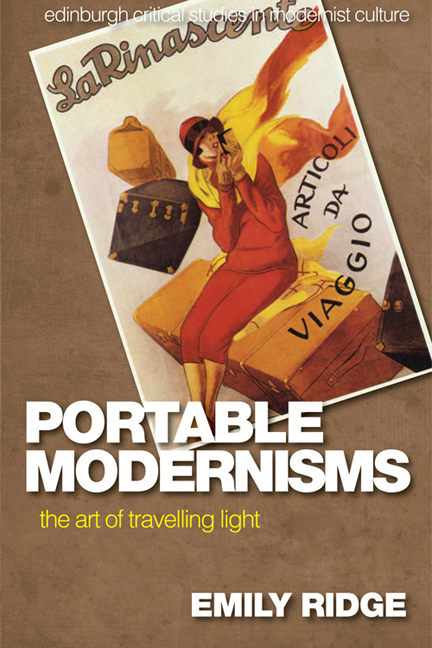Book contents
- Frontmatter
- Contents
- Illustrations
- Acknowledgements
- Series Editors’ Preface
- Dedication
- Introduction
- 1 ‘Living modernly's living quickly’: Towards Travelling Light
- 2 ‘A purse of her own’: Women and Carriage
- 3 ‘No one is safe from the beggar's pack’: Portability and Precarity
- 4 ‘Have you anything to declare?’: Portable Selves on Trial
- Conclusion
- Bibliography
- Index
Conclusion
Published online by Cambridge University Press: 22 December 2017
- Frontmatter
- Contents
- Illustrations
- Acknowledgements
- Series Editors’ Preface
- Dedication
- Introduction
- 1 ‘Living modernly's living quickly’: Towards Travelling Light
- 2 ‘A purse of her own’: Women and Carriage
- 3 ‘No one is safe from the beggar's pack’: Portability and Precarity
- 4 ‘Have you anything to declare?’: Portable Selves on Trial
- Conclusion
- Bibliography
- Index
Summary
‘My dear Henry’, Aunt Augusta said, ‘if you had been a young man I would have advised you to become a loader. A loader's life is one of adventure with far more chance of a fortune than you ever have in a branch bank. I can imagine nothing better for a young man with ambition except perhaps illicit diamond digging … ‘
‘Sometimes you shock me, Aunt Augusta’, I said, but the statement had already almost ceased to be true. ‘I have never had anything stolen from my suitcase and I don't even lock it’.
‘That is probably your safeguard. No one is going to bother about an unlocked suitcase. Wordsworth knew a loader who had keys to every kind of suitcase. There are not many varieties, though he was baffled once by a Russian one’.
In Graham Greene's Travels With My Aunt (1969), the elderly Aunt Augusta of the title advises her more conservative ex-banker nephew, the novel's narrator, who is later revealed as her son, on the profession of luggage loading. This novel is, in many ways, a nostalgic homage to an earlier epoch of travel, and both characters are, in their own ways, somewhat anachronistic. The septuagenarian Aunt Augusta, a woman who is pointedly shown to travel light and of an age to number among those first women who carried their own bags, is shown to cling onto a past full of adventurous escapades. Henry, on the other hand, attempts to recover a past life that never quite took off through embarking on a range of belated escapades in her company. I quote the above passage here because it reminds us that luggage and, correspondingly, a portable aesthetic, came to prominence in a literary age both of upheaval and of suspicion. However sour and destructive suspicion is shown to become, it was still the illicit allure of luggage – the cultivation of a collection of symptomatic keys and the bewilderment at the one case which yet resisted, the exhilaration at standing judgement over a locked case and the corresponding exhilaration at unlocked bluffing under scrutiny, the inscribed promise of transgressive discovery and of unsanctioned ‘adventure’ – that engaged creative attention.
- Type
- Chapter
- Information
- Portable ModernismsThe Art of Travelling Light, pp. 184 - 190Publisher: Edinburgh University PressPrint publication year: 2017

